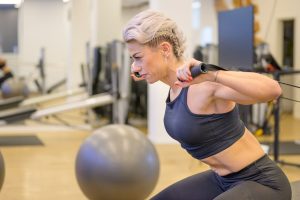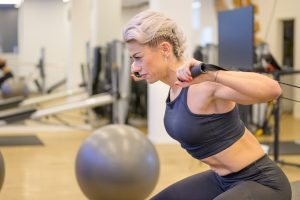menopause exercise © rocketclips – stock.adobe.com According to a recent systematic review published in BMC Women’s Health, the optimal aerobic exercise program for menopausal women experiencing sleep issues involves sessions of 70 to 90 minutes, conducted three times a week over a span of eight to ten weeks. A research team, which includes lead author […]

menopause exercise © rocketclips – stock.adobe.com

According to a recent systematic review published in BMC Women’s Health, the optimal aerobic exercise program for menopausal women experiencing sleep issues involves sessions of 70 to 90 minutes, conducted three times a week over a span of eight to ten weeks.
A research team, which includes lead author Liu Mingyi, Ph.D., from the College of Sports Training at Wuhan Sports University in China, evaluated 16 articles and 19 randomized clinical trials sourced from Web of Science, PubMed, Springer, Science Direct, and China Knowledge Network, comprising a total of 885 subjects in the experimental group and 982 in the control group. Their objective was to determine which exercises, their duration, and frequency could effectively address sleep issues related to menopause. The articles underwent a bias assessment using The Cochrane Risk of Bias Assessment Tool, focusing on six bias areas, including performance and detection bias. Sleep quality was assessed utilizing various scales, such as the widely recognized self-reported Pittsburgh Sleep Quality Index and the Insomnia Severity Index, frequently used in clinical settings for insomnia diagnosis.
The study indicates that sleep disorders are increasingly prevalent, impacting approximately 27% of the global population. Moreover, sleep disturbances represent some of the most frequently reported issues among menopausal women, affecting around 40% to 69%. Nevertheless, fewer than 40% of these women fulfill criteria for insomnia, highlighting a treatment gap, as detailed in an additional study published in Menopause.
Within the study from Wuhan Sports University, aerobic exercises were categorized into three types: dynamic exercises (such as walking and stepping), static exercises (like yoga), and a combination of both (including tai chi). The researchers found static exercises to be the most beneficial, likely due to their effectiveness in reducing muscle tension and regulating breathing.
Exercises were further divided based on whether they were performed in a group or individually. The findings were mixed regarding which setting was more advantageous. Some studies suggested that exercise classes foster a sense of community, while others proposed that exercising alone minimizes unnecessary stimuli and stress.
“Aerobic exercise can enhance sleep quality in menopausal women by stabilizing estrogen secretion, alleviating physical symptoms, and regulating negative emotions,” stated Mingyi and his colleagues. “Additionally, aerobic exercise may improve sleep quality by mitigating vasodilatory symptoms, hot flashes, headaches, palpitations, anxiety, and depression.”














